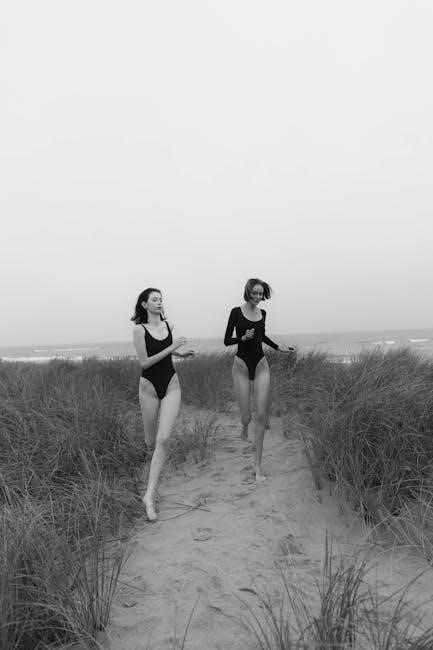Women Who Run with the Wolves by Clarissa Pinkola Estés is a transformative exploration of the Wild Woman archetype, weaving myths, stories, and Jungian psychology to empower women․
Overview of the Book
Women Who Run with the Wolves by Clarissa Pinkola Estés is a captivating exploration of the feminine psyche through intercultural myths, fairy tales, and stories․ First published in 1992 by Ballantine Books, the book became a New York Times bestseller, spending 145 weeks on the list․ Estés uses rich narratives to reintroduce the concept of the Wild Woman archetype, emphasizing intuition, creativity, and resilience․ The book serves as a guide for women to reclaim their instinctual nature, offering insights into overcoming societal constraints and embracing authenticity․ Its enduring popularity has made it a seminal work in feminist psychology and spirituality․

Author Background: Clarissa Pinkola Estés
Clarissa Pinkola Estés, born on January 27, 1945, is a renowned Mexican-American writer, Jungian psychoanalyst, and storyteller․ Known for her deep understanding of the human psyche, she has dedicated her work to exploring the feminine soul․ Estés earned her Ph․D․ in Jungian Psychology, which heavily influences her writing․ Her most famous work, Women Who Run with the Wolves, has become a cultural phenomenon, resonating with millions worldwide․ She has also written other books, such as The Gift of Story and Untie the Strong Woman․ Estés’s unique ability to weave myths, folklore, and psychological insights has established her as a leading voice in feminist literature and spirituality․
Publication Details and Popularity
Women Who Run with the Wolves was first published in 1992 by Ballantine Books․ The book achieved remarkable success, spending 145 weeks on The New York Times Best Seller list, a record at the time․ It has sold over 2 million copies in the U․S․ alone and has been translated into numerous languages․ Its popularity endures, making it a modern classic in feminist literature․ The book’s resonance stems from its universal themes of female empowerment and the reclamation of the Wild Woman archetype, drawing readers from diverse backgrounds and solidifying its place as a cultural and literary phenomenon․

The Core Theme: The Wild Woman Archetype
The Wild Woman archetype embodies women’s instinctual power and fierce creativity, as explored in Dr․ Clarissa Pinkola Estés’ work, guiding women to reclaim their untamed, visionary selves․
Definition of the Wild Woman
The Wild Woman is an archetype symbolizing women’s untamed, instinctual nature, embodying creativity, passion, and wisdom․ She represents the deep, life-giving force within women, unshackled by societal constraints, and connected to their true selves․ Rooted in intuition and resilience, the Wild Woman is a powerful, visionary figure who thrives in harmony with nature and her inner world․ Dr․ Clarissa Pinkola Estés describes her as a source of inspiration and healing, urging women to reclaim this essence to live authentically and wholeheartedly․ This archetype is not just a concept but a living, breathing energy that fuels personal and collective transformation․
Importance of the Archetype in Modern Society
The Wild Woman archetype holds profound significance in modern society as it empowers women to reclaim their instinctual nature and challenge rigid gender roles․ In a world that often suppresses female intuition and creativity, this archetype offers a framework for women to embrace their authenticity and resilience․ By reconnecting with the Wild Woman, women can break free from societal expectations and cultivate a deeper sense of self-worth․ This archetype also fosters a sense of community and shared strength among women, helping them navigate the complexities of contemporary life with courage and grace․ Its timeless wisdom continues to inspire personal and collective transformation․

Key Themes and Concepts
The book explores myths, intuition, and personal growth, emphasizing the power of storytelling and the instinctual nature of women to foster empowerment and self-discovery․
The Power of Myths and Stories

Dr․ Estés uses intercultural myths and fairy tales to illustrate the Wild Woman archetype, showcasing how these stories reveal deep truths about female psychology and resilience․ By examining folklore from diverse traditions, she highlights the universal themes of female empowerment and the struggle for autonomy․ These narratives serve as a mirror, reflecting the inner strength and creativity that women often suppress․ Through storytelling, Estés bridges the gap between the conscious and subconscious, offering a pathway for women to reclaim their instinctual nature and embrace their authentic selves․ This approach makes the book a powerful tool for personal transformation and healing․
The Role of Intuition and Instinct in Women’s Lives
Dr․ Estés emphasizes intuition and instinct as vital aspects of the Wild Woman archetype, guiding women toward self-discovery and empowerment․ These innate qualities, often marginalized by societal expectations, are portrayed as essential for navigating life’s challenges and making authentic decisions․ Through stories and myths, Estés illustrates how intuition serves as a compass for personal growth, helping women trust their inner wisdom and reconnect with their natural selves․ By embracing these qualities, women can overcome external pressures and reclaim their instinctual power, fostering a deeper understanding of their true potential and inner strength․

Psychological and Cultural Insights
The book bridges Jungian psychology and cultural myths, offering insights into women’s instinctual wisdom, societal conditioning, and the universal quest for balance in modern life․
Jungian Psychology and Its Influence on the Book
Clarissa Pinkola Estés draws heavily from Carl Jung’s concept of the collective unconscious, using myths and stories to explore the Wild Woman archetype․ By interpreting fairy tales and folktales through a Jungian lens, she reveals the universal symbols and instincts shared across cultures․ This approach highlights the process of individuation, where women integrate their unconscious and conscious selves․ Estés applies Jungian principles to empower women, encouraging them to reclaim their instinctual nature and break free from societal constraints․ Her work bridges psychology and spirituality, offering a profound understanding of the feminine psyche and its transformative potential in modern life․

Cultural Myths and Folk Tales from Diverse Traditions
Clarissa Pinkola Estés weaves together a rich tapestry of cultural myths and folk tales from around the world, drawing on Latina, European, and indigenous traditions․ These stories, such as La Loba and The Red Shoes, illustrate the universal qualities of the Wild Woman archetype․ By sharing these narratives, Estés highlights the shared human experiences of resilience, intuition, and transformation․ The book bridges cultural divides, showing how these timeless tales empower women to reclaim their instinctual nature and live authentically․ Estés’ use of diverse traditions underscores the global relevance of the Wild Woman’s journey, making her work deeply relatable and universally inspiring․

Reception and Impact
Women Who Run with the Wolves became a cultural phenomenon, topping bestseller lists for 145 weeks and selling over 2 million copies․ Its empowering message resonated globally, inspiring women to embrace their true selves and reclaim their wild, instinctual nature․ The book’s impact extended beyond literature, sparking conversations about feminism, psychology, and spirituality, leaving a lasting legacy in modern thought and women’s empowerment movements worldwide․
Bestseller Status and Reviews
Women Who Run with the Wolves achieved remarkable success, spending 145 weeks on The New York Times Best Seller list and selling over 2 million copies․ It also topped USA Today, Publishers Weekly, and Library Journal bestseller lists․ Critics praised its poetic prose and deep insights, with Alice Walker calling it a “gift of profound insight” and Maya Angelou describing it as a “road map” for women reclaiming their instinctual selves․ The book’s empowering message resonated widely, earning it a place as a modern classic in feminist and psychological literature․

Personal Growth and Empowerment for Women
Women Who Run with the Wolves has become a cornerstone for women seeking personal growth and empowerment․ By exploring the Wild Woman archetype, Dr․ Estés guides readers to reclaim their instinctual nature, fostering resilience and self-discovery․ The book’s rich storytelling and psychological insights help women break free from societal constraints, embracing their authentic selves․ Its transformative power has made it a beloved resource, inspiring women to reconnect with their inner strength and creativity, leading to profound personal and spiritual renewal․ The book’s enduring popularity reflects its ability to resonate deeply with women worldwide․
Women Who Run with the Wolves stands as a cultural touchstone, empowering women to embrace their wild, instinctual nature․ Its enduring legacy continues to inspire personal growth globally․
The Legacy of “Women Who Run with the Wolves”
Women Who Run with the Wolves has left an indelible mark on feminist literature and psychology․ Selling over 2․7 million copies, it remains a cultural touchstone, inspiring women to reclaim their wild, instinctual nature․ The book’s use of intercultural myths and Jungian insights has made it a timeless resource for personal growth․ Its impact extends beyond literature, influencing empowerment movements and fostering a deeper understanding of the feminine psyche․ As a testament to its enduring relevance, the book continues to resonate with readers worldwide, cementing Dr․ Estés’ legacy as a visionary thinker in women’s spirituality and psychology․
Final Thoughts on the Book’s Significance
Women Who Run with the Wolves is a groundbreaking work that has inspired millions to embrace their true selves․ Its exploration of the Wild Woman archetype offers a powerful metaphor for female empowerment, encouraging readers to reclaim their instinctual nature․ The book’s timeless wisdom, drawn from myths and stories across cultures, resonates deeply with women seeking to reconnect with their inner strength․ As Maya Angelou noted, it is a “gift of profound insight, wisdom, and love․” With its enduring popularity, the book remains a cornerstone of feminist literature, guiding women to trust their instincts and live authentically․



